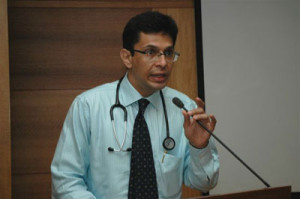Pathologists and clinical laboratory managers can expect to see more international press coverage of efforts to improve medical laboratory quality in developing countries
In some developing nations, the lack of reliable, accessible medical laboratory testing is getting wide coverage in the local press. This is true of recent events involving pathology laboratories located in India, Nepal and Sri Lanka.
Reliability and Accuracy of Medical Laboratory Test Results
In India, the convergence of two trends is spurring government action. First, both patients and their physicians are losing confidence in the reliability of medical laboratory test results.
Second, drug-resistant strains of tuberculosis (TB) have emerged in India. The spread of these strains from India into other countries is a major concern of public health officials in nations across the globe.
Meanwhile, there is a steady flow of news stories in Nepal and Sri Lanka about how inaccurate medical laboratory test results are causing great suffering and hardship. “Many people have similar stories…of suffering,” reported Nepal journalist and U.N. Indigenous Fellow, Dev Kumar Sunuwar.”
Sunuwar reported that people in his country often have to travel from place to place at great expense, but are unable to get an accurate diagnosis. Nepal’s My Republica published the story.
It is a similar situation in Nepal. The number of patients visiting hospitals with conflicting diagnoses based on inaccurate diagnostic test results has increased appallingly in the last couple of years. That’s according to Dr. Bhupendra Basnet, Associate Professor, Department of Medicine, at Nepal’s National Academy for Medical Science Bir Hospital (NAMS) in Kathmandu. Basnet also serves as General Secretary of the Nepal Medical Association.
Health Officials in India Raid Private Pathology Laboratories
In India, the situation has escalated to the point where government agencies have had to take action, according to a recent story published in The Times of India. Private laboratory owners are “at war” with policy makers and government agencies. Health officials in Thiravananthapuram, Kerala, in south-west India have been conducting raids on private clinical laboratories.

Pictured above is Dr. Zarir Udwadia, a physician practicing in Mumbai, India. Last December, he discovered the first confirmed case of a new drug-resistant strain of Tuberculosis. Now healthcare policymakers in India have declared a program to develop a nationwide network of medical laboratories that can accurately detect drug-resistant strains of TB. (Photo copyright drzarirudwadia.com.)
The raids were in response from a growing number of complaints by patients about inaccurate medical laboratory test results and price-gouging. Officials issued closure notices to 22 laboratories in that region.
Owners of these private pathology laboratories contend that the government’s raids are illegal. “The government has not issued any guideline or policy for operating medical laboratories in the state,” stated medical laboratory technologist (MLT) T. A. Varkey, Ph.D., President of the Laboratory Owner’s Association, noted The Times of India in its coverage of these events.
District Medical Officer T. Peethambaran declared such raids would continue against “those establishments functioning in a manner that aid the spread of communicable diseases,” stated a story recently published in The Hindu.
Nepal Study Confirms Majority of Labs Fail to Meet Government Criteria
The Nepal Association for Medical Laboratory Science (NAMLS) conducted a study from August 2008 to January 2009, journalist Sunawar reported. The study was titled “Status of Private Clinical Laboratory Medicine Service”. It showed that 84% of the pathology labs in and around Kathmandu Valley did not meet core governmental standards.
According to pathologist Geeta Shakya, Director of the National Public Health Laboratory (NPHL), there is no pathology laboratory policy in Nepal.
“In the absence of a regulating body and stringent legislation, pathology laboratories and diagnostic centers in the country are sucking money out of destitute patients,” stated Ram Chandra Simkhada, Secretary of Forum for Protection of Consumer Rights, in the Sunawar story.
Monitoring of Sri Lanka’s Medical Laboratories Is Overdue
Sri Lanka’s Daily News opined that government action to regulate and monitor medical laboratories is long overdue.
“We received a considerable number of complaints from the public, with a majority of them on the accuracy of the medical reports,” stated Dr. M.G.P. Samarasinghe, Deputy Director General (Laboratory Services) in the Sri Lanka Health Ministry in a story, published in the the Sunday Times.
Drug-resistant Tuberculosis Outbreak in India
The Wall Street Journal recently published a story titled, “Woman’s Drug-Resistant TB Echoes Around the World”. The story suggested that India’s failures in medical laboratory testing, misdiagnosis, and mistreatment of regular cases of tuberculosis have led to multiple drug-resistant strains.
“We have managed by a combination of complacency and incompetence to allow this bacillus to mutate into a virtually untreatable form,” Mumbai physician, Zarir Udwadia, M.D., DNB, FRCP, FCCP, wrote in a paper published in Respirology. Respirology is the journal of the Asian Pacific Society of Respirology. It was Udwadia who, last December, discovered the first confirmed case in India of the mutated TB strain.
Policy makers in India at first rejected Udwadia’s findings. Now, they intend to expand a nationwide network of sophisticated medical laboratories capable of detecting drug-resistant TB. This is the first concerted effort to rein in India’s poorly regulated private health-care sector, according to the WSJ.
For pathologists and clinical laboratory managers, this story signals two things. First, it is evidence that globalization means not only increasingly greater economic integration and opportunity. It also means an increasing threat of unexpected outbreaks and the spread of infectious disease. Second, clinical laboratory infrastructure and quality will increasingly be a topic of focus for developing, as well as developed, countries.
—Pamela Scherer McLeod
Related Information:
India steps up TB fight as fears of drug-resistant strains mount
Totally drug-resistant tuberculosis in India: Who let the djinn out?
The Killing Clinics of Nepal-Government Mum on Illegal Operations
Status of Private Clinical Laboratory Medicine Service



